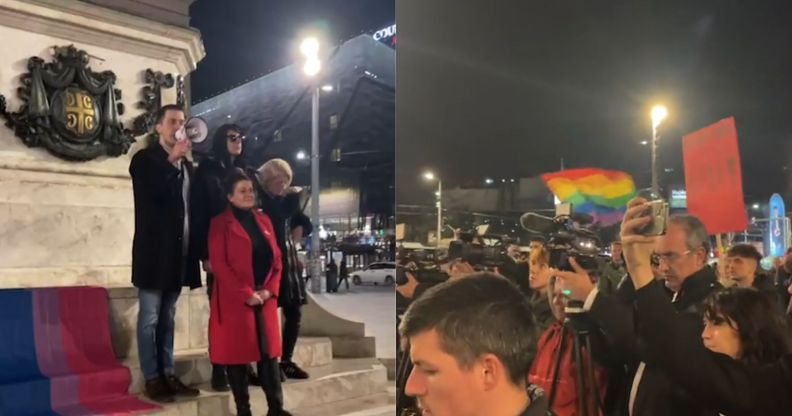Serbia: LGBTQ+ activists protest against alleged police brutality

LGBTQ+ activists during a protest in Belgrade, Serbia. (Instagram/Da Se Zna)
Hundreds of protestors gathered in the capital of Serbia, Belgrade, to call for prosecutions over claims of police brutality.
Marching on Wednesday (6 March), the protestors called on the authorities to address an incident on 26 February in which two LGBTQ+ people were allegedly abused during a police raid.
Activists marching alongside the activist group Da Se Zna (which translates as ‘To Be Clear’) alleged that the two individuals, whose home was raided following claims of drug use, were abused, tortured and sexually harassed.
“We are often told that we should keep our love within our own four walls,” one protestor told RadioFreeEurope. “I don’t agree with that, first of all, but we also see that they don’t even let us have peace within our four walls.
Another activist, Valerian Savic, said: “My message today is that it is necessary to educate the police force about sensitivity toward the marginalised LGBT community and generally work toward raising public awareness on all LGBT issues.”
Officials reportedly said they were investigating a complaint made against the officers and the raid, and were focusing on “determining the truthfulness of the allegations”.
The police officers “will be sanctioned in accordance with the law if it is determined that they exceeded their powers”, they said. Da Se Zna alleged, however, that investigating officials had already rejected the complaint.
Queer rights are a contentious issue in the Balkan nation, where social policies are heavily influenced by the Serbian Orthodox Church. What few rights LGBTQ+ people have in the country have been hard-fought, while adoption and same-sex marriage have yet to be legalised.
A World Values Survey from 2022 found that 67 per cent of Serbs believe homosexuality is morally unjustifiable, while just 10 per cent believe it to be justifiable. And 51 per cent said they would not accept a neighbour if they were queer.

